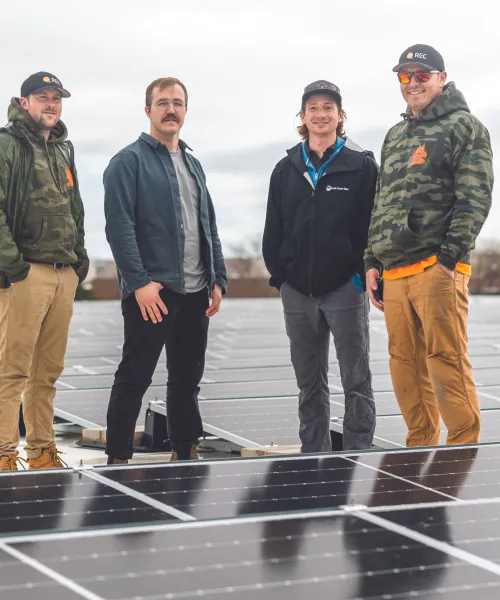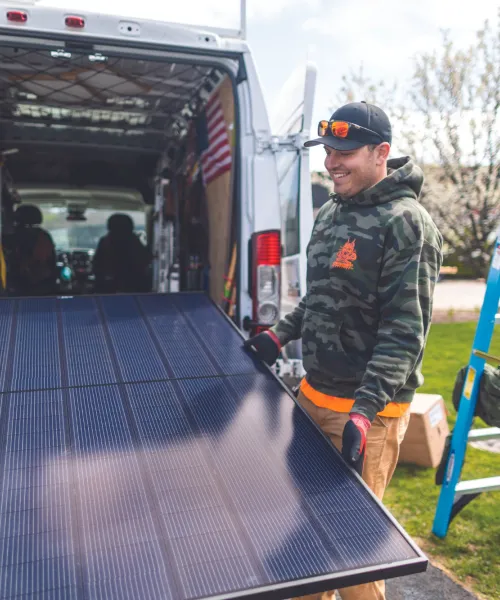
By Rebecca Tavernini '11 MA
“Had I gone to school in the city, I might not have developed such a passion for the outdoors and the environment. My time at NMU definitely reinforced my desire to protect it,” said Jeremy Vavrik ’12 BS, co- founder and president of Fresh Coast Solar, based in Chicago.
Fellow co-founder and director of operations Adam Kay ’16 BS heartily agreed: “Correlating our enjoyment for the outdoors with an industry that protects the outdoors is a philosophy that really came together at Northern.”
It made sense for Kay, being an electrical engineering/ renewable energies major, but for Vavrik, a secondary education English major, it wasn’t immediately a natural fit. “It works out really well, actually, because we do a lot of proposals and need Jeremy’s skills,” said Kay, half joking.
As students, Adam worked with Professor Sarah Mittlefehldt on a solar feasibility study for NMU and with NMU facilities Associate Director Gisele Duehring exploring the potential for solar at the NMU Golf Course. They also met Ian Olmsted '19 BS, another NMU alum who founded Marquette-based Peninsula Solar. Vavrik became his first full-time solar employee with Kay to follow several years later. They both played a role in Peninsula Solar’s installation of a large solar array for
the Marquette Board of Light and Power. Vavrik helped to develop the project, and Kay helped to build it. A year ago, Olmsted installed NMU’s first solar panels, funded by NMU students through the Green Fund.
Armed with practical knowledge and passion for this burgeoning “green collar” industry, Kay and Vavrik returned to their home state of Illinois to launch Fresh Coast Solar in 2018, knowing the Chicago area would give them the opportunity to make a much bigger impact. The move paid off, and just this year the company ranked number 887 on the Inc. 5000’s list of fastest-growing companies. The company that started with “a van and a plan” has grown into a full- service renewable energy contractor, with nearly 1000 residential solar arrays installed, along with dozens of major commercial and municipal projects. Starting with just the two of them, Kay and Vavrik now have 18 full-time employees, some of whom are fellow Northern alumni, including Jake Doetsch ’18 BS and Tim Hutchinson '16 BS, who are lead installers for the company. Lightheartedly, they even have a Wildcat- themed sweatshirt that gets awarded to any installer who works a 12/12 pitch roof in the wintertime (for those who don’t know - that’s a very steep roof in cold and icy conditions). “A well-deserved reward,” Vavrik laughed. “It’s a little Fresh Coast rite of passage. Even my wife has earned one.”

“Every Fresh Coast Solar project is 100% customized by our team,” said Kay. “We look at the customer’s electric bill, and use satellite imagery and GIS technology to project how much sunlight will hit a specific area. When we model, we also reference 30 years of weather data to make accurate predictions. The technology around solar design has become very impressive over the last decade, and it’s only getting better.”
For a residential project, they said the average cost is $20,000 - $30,000 depending on how much electricity is being used. But with state and federal incentives, about 50% of the cost is covered in Illinois. It’s a seven- to eight-year payback period and will save tens of thousands in electricity costs over a system’s lifetime. In Michigan, a 30% federal solar tax credit is available for homeowners but it lacks state incentives like its neighboring state of Illinois.
“In conversations throughout the process, some customers are focused on carbon offset and environmental concerns, others are focused on energy independence and decreasing their reliance on the utility,” says Vavrik. “Regardless of what got them interested, all of them love saving money.”
For larger projects, many funding mechanisms now exist that allow for little-to- no upfront investment. For instance, at the College of Lake County in Grayslake, Illinois, where Fresh Coast installed 5,500 panels, a third-party financier provided the funds for materials and labor. It owns the system and sells the electricity that is generated back to the college at a discounted rate. “It’s a win/win for everyone,” said Vavrik. “We create jobs through the design and construction of the solar array, the financier breaks even on their investment after several years and begins making money on the sale of the energy, and the college saves money from day one with no money out of pocket. They greatly reduce their carbon footprint and can use those savings to further their offerings to their students.”
The cofounders say it’s critical to make solar more accessible to the public and accepted on a wider scale. The company is working with Chicago-based job training programs to further develop programs to equip people in low-income communities with the skillsets needed to enter and benefit from the solar industry.
Kay and Vavrik will always be grateful for their start in Northern Michigan. Looking back, they said they have gained so much from their time in Marquette and with Peninsula Solar, taking that knowledge to their flourishing solar business in Chicago. It started as humbly as it could, out of Vavrik’s garage in his rented apartment, with vans that were often the target of Chicago graffiti “artists.” The pair has not only seen acceptance and availability of solar energy grow, they have made it happen. It’s far from just a hippie dream today.
“My time at Northern helped shape what I’m doing now, though I didn’t realize it at the time,” said Vavrik. “It’s hard to imagine how different my life would be without my time in Marquette.”
Kay added, “We’re making a good living and doing something good for the planet. It’s exciting to be in this space and it feels like just the beginning.”
